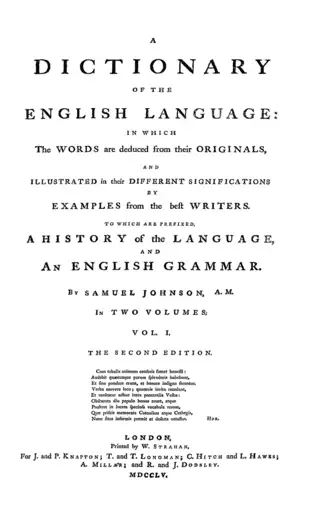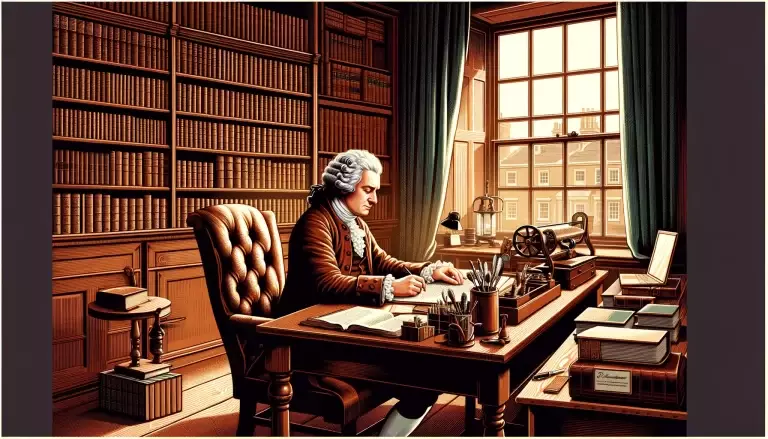Introduction
Dr. Samuel Johnson, an 18th-century literary giant, is best known for his contributions to English literature and lexicography. His works, including the monumental “A Dictionary of the English Language,” have left an indelible mark on the world. In this post, we will explore his life, major works, influence on the English language, and his lasting impact on literature and society.
Table of Contents
Early Life and Background
Samuel Johnson was born on September 18, 1709, in Lichfield, Staffordshire, England. The son of a bookseller, Johnson grew up surrounded by books and developed an early love for reading. Despite suffering from various health issues, including scrofula, Johnson showed remarkable intellectual promise. He attended Pembroke College, Oxford, but had to leave without a degree due to financial constraints. His early life was marked by adversity, but these challenges only fueled his determination to succeed.
Major Works and Contributions
Johnson’s literary career is filled with significant works that continue to be studied and admired today.
- A Dictionary of the English Language (1755): This work was a groundbreaking achievement in lexicography. It was the most comprehensive English dictionary of its time and served as the authoritative reference for over a century. Dr. Samuel Johnson’s dictionary not only defined words but also provided etymologies and usage examples, setting a high standard for future dictionaries.

- The Rambler (1750-1752): This series of bi-weekly essays tackled moral, philosophical, and literary topics. Johnson’s insightful and eloquent writing in The Rambler cemented his reputation as a leading intellectual of his time.
- The Lives of the Most Eminent English Poets (1779-1781): In this collection, Dr. Samuel Johnson provided biographical and critical studies of notable poets. His analyses were both insightful and critical, offering a deep understanding of each poet’s work and legacy.

- Rasselas (1759): This philosophical novel explores themes of happiness and the human condition. It reflects Johnson’s contemplative nature and his ability to weave philosophical inquiry into compelling narratives.
Influence of Johnson’s Dictionary
Johnson’s dictionary was not just a linguistic tool but a cultural artifact.
- Standardization: The dictionary played a crucial role in standardizing English spelling and usage, providing a reliable reference for writers and scholars.
- Cultural Impact: Johnson infused the dictionary with his wit and moral perspective, making it a reflection of his personality and intellect.
- Longevity: Johnson’s dictionary remained the primary reference for English lexicography until the publication of the Oxford English Dictionary in 1884. Its influence on the English language is still acknowledged today.
Johnson’s Impact on Literature and Society
Beyond his dictionary, Johnson made substantial contributions to literature and society.
- Literary Influence: Johnson was a prolific writer and critic. His essays, critiques, and biographical works set high standards for literary excellence and influenced countless writers.
- Social Influence: Johnson was a central figure in London’s intellectual circles. He co-founded the Literary Club with Joshua Reynolds, which included prominent figures like Edmund Burke and Oliver Goldsmith. Johnson’s conversational skills and wit made him a revered and influential figure.
- Posthumous Legacy: Johnson’s life and works have continued to be celebrated. James Boswell’s “The Life of Samuel Johnson” is regarded as one of the greatest biographies in the English language, ensuring that Johnson’s legacy endures.
Relevance of Dr. Samuel Johnson Today
Dr. Samuel Johnson remains relevant for several reasons.
- Timeless Themes: His exploration of human nature, morality, and happiness in his works remains pertinent.
- Lexicographical Legacy: Johnson’s approach to dictionary-making laid the groundwork for modern lexicography, influencing how dictionaries are compiled and used today.
- Cultural Figure: Johnson’s role as a cultural commentator and moralist continues to be celebrated, and his works are studied for their insight, wit, and literary merit.
Conclusion
Dr. Samuel Johnson’s contributions to literature and the English language are monumental. His works continue to inspire and educate, making him a timeless figure in literary history. For more such educational posts, keep visiting litgram.in.



1 Comment
Pingback: The Evolution of the English Novel: From 18th Century to Modern Day - LitGram by MukeshRishit